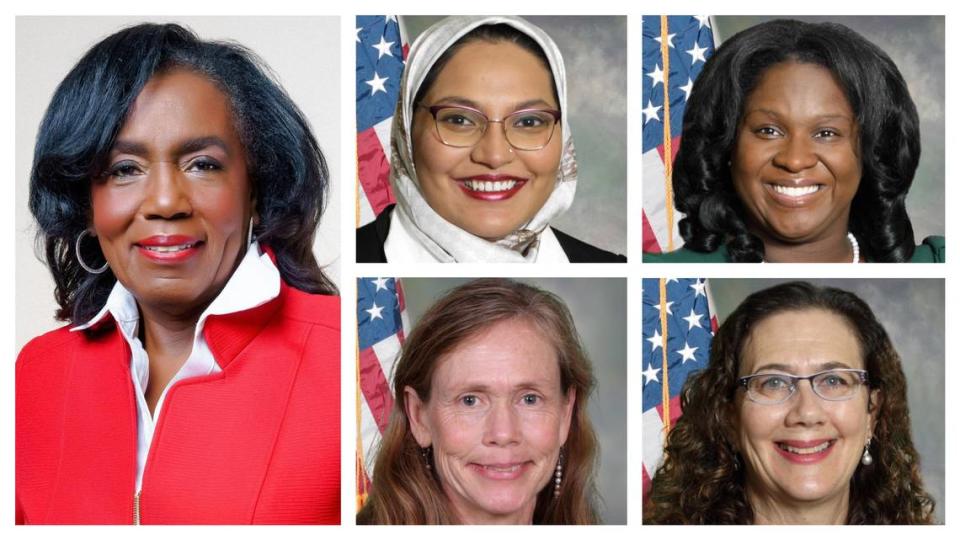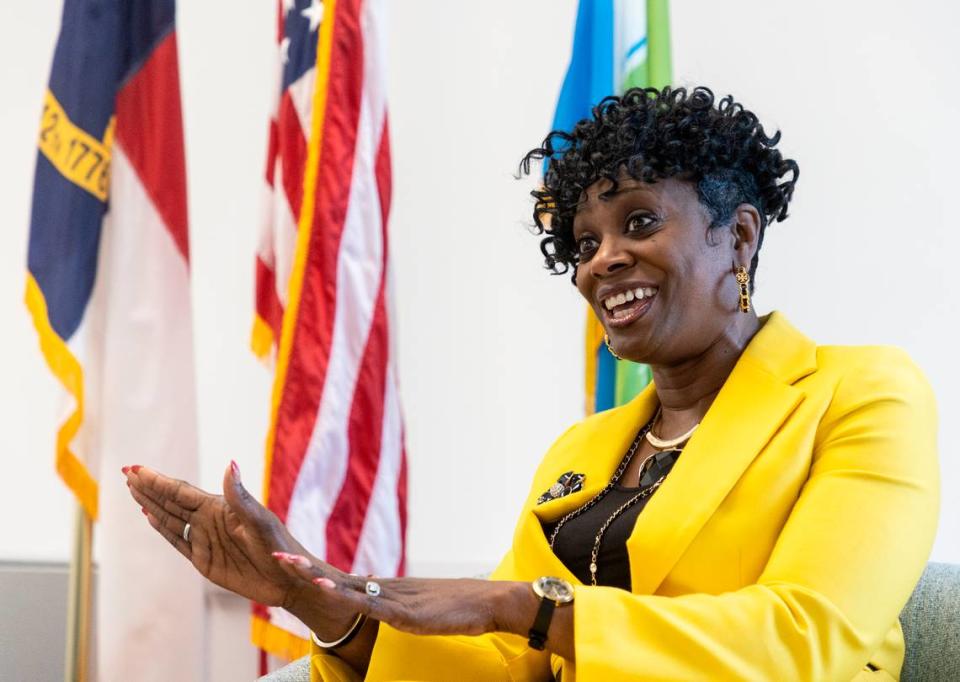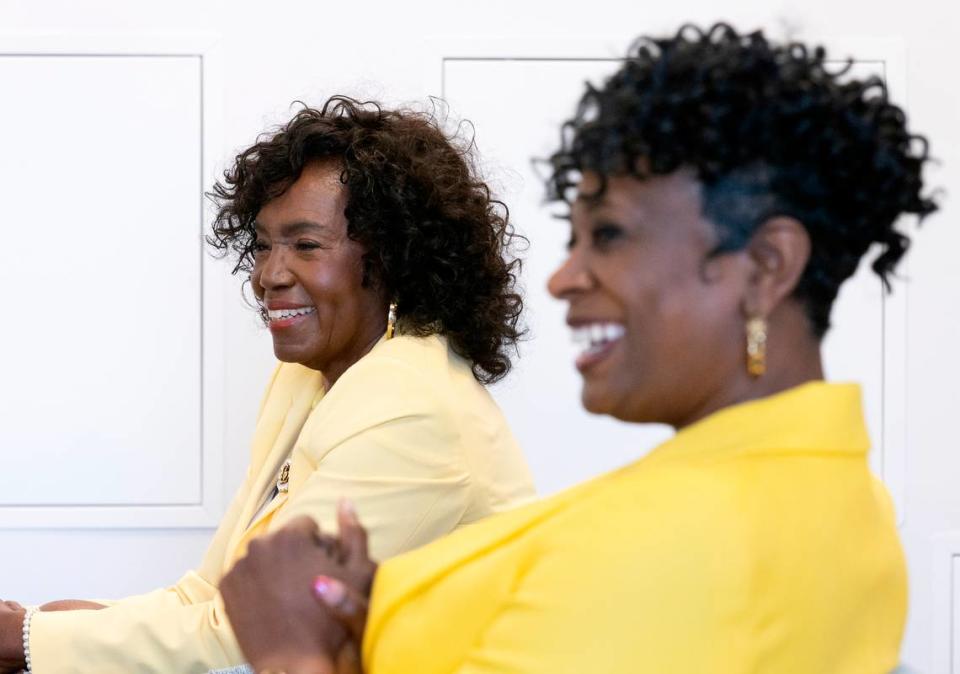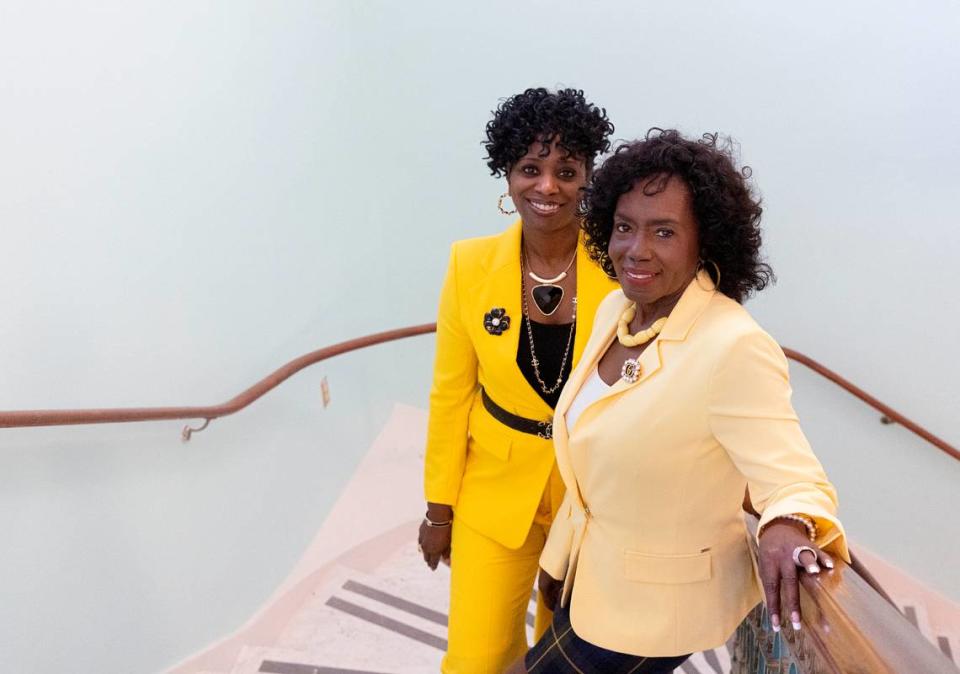‘Be comfortable asserting your leadership’: Top county officials share their journeys
Durham County elected its first all-female Board of County Commissioners in 2020, making it unique among communities its size.
Chair Brenda Howerton, 76, and County Manager Kimberly Sowell, 55, sat down with The News & Observer to reflect on their journeys to leadership.
They talk about growing up in big families in less well-off parts of North Carolina, demanding respect when it isn’t given, subverting the stereotype of the “angry Black woman,” and loving the color of their skin.
Durham stands out in the state, but does this time in history feel unique to y’all?
Howerton: It’s very special. I’ve been a commissioner for 14 years, and I have been the only African-American female at any one time for most of that. To see not just Black females but all females on our board has been pretty exciting. And then to see people that look like me across the country that are in leadership, it’s pretty empowering.

What were your first impressions of Durham?
Sowell: I moved in March of last year. Before I even applied for the job, Durham is where my husband and I would come to play and enjoy life, to shop and eat. I’m a foodie.
It was almost like when I would come to Durham, it wasn’t like I had to pretend to be anybody else. You are just welcomed and accepted for who you are and what you bring to the community. That inspired me. That’s a community that I want to be a part of.
Howerton: I grew up in Caswell County. Went to school in Yanceyville and moved here in 1986.
What brought you here?
Howerton: The excitement of the (Research Triangle) Park. The excitement of opportunity. I lived in Danville, Virginia, and there was no growth possibility there. I wanted to continue my education and there was only one college there, Averett, that I couldn’t afford to go to. I had four kids then and two were in college and as a single mom, I’m trying to take care of these kids, but also knew that I needed to continue my education.
Coming to Durham and the Research Triangle Park, I just got so excited. I’d never seen a building like Burroughs Wellcome before and knew that looking at the community colleges here along with NCCU and Shaw University, that I could go to school at night and work during the day. I got a U-Haul truck one day and loaded up my personal stuff and my youngest and we drove to Durham, parked in the parking lot and found somewhere to live.

Whose shoulders do you stand on?
Sowell: I have to start with my mom. Her name is Geraldine Hammond. My biological father passed away when I was 10 and so for most of my life, at least my formative years, I was raised by a single parent. And just to watch how she navigated life, provided for our family, and my mother is a very spiritual woman, so I grew up in the church. We had to go to church, even if I went out on Saturday night and stayed out late, you better be in church on Sunday morning. She instilled in me a sense of pride, and a work ethic that has taken me throughout my career.
And getting into my career, I didn’t see a lot of female leadership, but especially Black female leadership until I got to North Carolina A&T State University.
And now looking at people like Michelle Obama, Keisha Lance Bottoms, Vice President Kamala Harris. The way that they carry themselves and the way they exhibit leadership. To me, those are the shoulders that I stand on as well.
Howerton: My road was a difficult road. We can talk about Ida B. Wells and all of the women that have gone before me that were leaders. And then I can talk about my teachers. I could talk about my mother. My mom grew up in a difficult time. There were nine of us, so it was tough, but she worked consistently.
Back when Black people were just beginning to work in exclusive stores, there was a retail store that I wanted to work in because it had the clothing and the attitude that I thought I wanted. I kept showing up every day and they’d say, “We don’t have any jobs for anybody like you.” So I’d leave and go home and cry. And then the next day I’d get up and I’d go back.
Finally Mrs. Lester, who owned the store, said to me, “OK, be here in the morning at 8 o’clock.” I came back the next morning at 10 minutes to 8. She was sitting at the door waiting and she said, “If you had been two minutes late, I would have told you this job was not for you.” Most of the time I’m on time today. It started then.
The people that I kept running into that said that I couldn’t do something was always that motivator. Tell me I can’t and I’ll show you that I can.

And then when I moved to Durham, there have been women that have taken me under their wing. Sylvia Kerckhoff, the first female mayor of Durham, she was my first mentor in the political arena.
So, there have been so many women that I stand on their shoulders, because none of us do anything by ourselves.
Sowell: And if I can say too, now we get to stand on her shoulders as the chair of our Board of Commissioners. Brenda Howerton is fearless. She has taken on some of those issues that people have long since shied away from.
Do you recall the first time you saw a Black woman in leadership?
Howerton: When I went to work at the boutique in Danville, there was one Black female in that store. She handled herself in such a manner that I said — I want to be that. I want to be able to dress like that. Because I came from a poor upbringing, didn’t have really nice clothing. And growing up on a tobacco farm, my language was not the best. It was not the way that I speak today.
When I started to try it, you know, it’s kind of like when you’re trying a new dance and you’re stepping all over yourself. And when I didn’t pronounce my words correctly, the owner Mrs. Lester, she would correct me. And it would make me furious because it was embarrassing. I remember she did that one day in front of a customer and I was so furious, I went in the back in the stock room and I refused to come back out.
She kept saying: “You have to come back on the floor.”
I said, “I’m not until you apologize to me, because you embarrassed me.”
And she says, “Why do you think I should apologize to you?”
“Because I’m a human being and you should apologize to me in front of the folks that you just embarrassed me in front of.”
She says, “I should just fire you.”
I said, “You can do that.”
And I wouldn’t go back out. She went out on the floor and about 10 minutes later, she comes back and says, “Come on out here.” And she called the people that she had embarrassed me in front of and she apologized.
Now she could have fired me. But she saw something in me that I didn’t see at the moment. I was stubborn. I was determined that I wasn’t going anywhere. I was refusing to be put down.

Do y’all feel like your identity as Black women helps the county make new connections?
Sowell: For me, the answer is yes.
One of the things that I’m very intentional about is creating understanding, especially with people that are from different backgrounds, different cultures. Because for Black females, there is this stereotype of the angry lack woman. I take pleasure in having uncomfortable conversations with people to help provide an understanding of — I’m passionate. I’m not angry. I’m committed. I’m not stubborn.
I grew up in a single home, so for my early years, we stayed with our grandparents. There were nine of us in one bedroom. Two people on the bottom bunk, two people on the top bunk. OK, that’s how I grew up. And it was in an all Black neighborhood. I was socialized in a Black neighborhood in a house full of Black people. It was probably middle school when I was introduced to people from another culture.
I learned early that, “Oh, wow. I’m different.” And people treat me different. But I don’t want to be treated different. So what can I do? To make sure that I’m treated just like everybody else. So I learned the art of acculturation. So while I am very secure in who I am as a Black person, I have learned what makes people from other cultures comfortable in my presence. And so I’m able to disarm people. When I come into a room, whether it’s a room full of white people, Asian people, Middle Eastern people, it doesn’t matter. And once they’re comfortable. I feel very secure in explaining how things look from the Black perspective.
Howerton: When I ran for county commissioner, my focus was on our young people. It doesn’t matter what shade that youth’s skin is. Our youth are up against so much in our society right now. So much gun violence, so much around drugs, and it pains me. The thing that’s difficult sometimes is having people that don’t look like me understand that pain.
If I cry in public, people just think I’m being weak, but if I was a white female that cries in public, everybody thinks they need to put their arms around her and comfort her. They have to see my strength. I know that society has to see me as a strong Black woman. And I am.
Do you still encounter discrimination?
Howerton: Yeah. You know what? I walk in a room and chocolate is there. Color is there. I can’t deny it. Nobody else can deny it. It’s there.
(laughter)
I am proud of the color of my skin. And it does create challenges. I remember being president of the association years ago for the state and I’m sitting at the table and I have a white male on this side and a white male on this side. They’re talking past me as if I don’t exist. Well they forgot I had the gavel, so what I did was I took the gavel and I banged it 1-2-3 as hard as I could on the desk. I got their attention and just expressed to them, you will not do that. You will not ignore me this way. Well, all the women in the room, which was probably about 10 out of 50 people, stood up and started applauding because I was them and they were me.
So yeah, I experience it all the time. I just have to continue to move like it doesn’t exist.
Sowell: Being a Black female, you’re in two different minorities. And so you don’t know if the discrimination is coming because you’re Black or because you’re a woman. Right? Which one is it? You just don’t know. So you just have to be prepared to stand up for yourself, to be confident in what you know and to be comfortable asserting your leadership.

What about your sisterhood beyond Durham County? The presidents of the state and national associations of counties also are Black women.
Howerton: Women don’t get to these levels of expertise without having the intellect, the knowledge to get there. It just so happens that this is the first time ever that we have had this many African American women, Black and brown women, at these levels. We shouldn’t have to say that.
We shouldn’t have to say that, “I’m the first.” In this day and time we’re still saying, “We’re the first.” My God.
Sowell: When we do get to these levels, we are tested. You have to prove that you are competent over and over again
Howerton: Over and over again.
Sowell: We don’t get a pass.
This conversation has been lightly edited for length and clarity.

